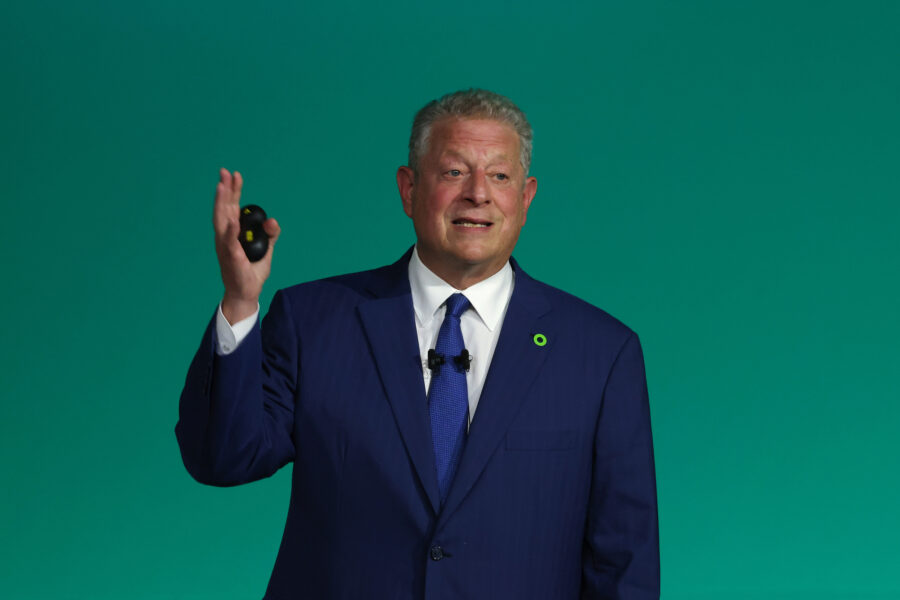Energy Secretary Rick Perry said Monday he does not believe carbon dioxide emissions are the main driver of the earth’s record-setting warming, a core finding of climate science. Instead, Perry said, the driver is most likely “the ocean waters and this environment that we live in.”
Perry became the second of President Donald Trump‘s cabinet members to go on television to publicly dismiss the importance of CO2 in global warming, ignoring the scientific evidence. Environmental Protection Agency Administrator Scott Pruitt rejected its role in answer to essentially the same question in March, also on CNBC’s “Squawk Box.”
But Perry went further in his response to CNBC host Joe Kernen—who has expressed his own skepticism about climate science in the past—when asked whether he viewed carbon dioxide as the main “control knob” for climate.
“No. Most likely the primary control knob is the ocean waters and this environment that we live in,” Perry, a former Texas governor, said.
Despite the fuzzy, circular illogic of that reply, Perry went on to say that skepticism about the scientific consensus is a sign of a “wise, intellectually engaged person.”
[Update: The American Meteorological Society wrote to Perry on Wednesday, raising serious concerns about his comments on CNBC.
“It is critically important that you understand that emissions of carbon dioxide and other greenhouse gases are the primary cause,” the AMS letter says. “This is a conclusion based on the comprehensive assessment of scientific evidence. It is based on multiple independent lines of evidence that have been affirmed by thousands of independent scientists and numerous scientific institutions around the world. We are not familiar with any scientific institution with relevant subject matter expertise that has reached a different conclusion.”
“Without this fundamental understanding of the science, it is impossible to discuss potential policy changes in meaningful ways,” the letter continues. “DOE programs have a major role to play in developing and informing the solutions for our nation’s future energy needs, so it is especially important that the best possible science and understanding is applied to policy issues with respect to DOE programs.”]
Perry’s statements come at a time of record-setting temperatures around the world. The U.S. southwest is entering a brutal heat wave, parts of the Middle East are even hotter, and a fatal wildfire in Portugal punctuated a tremendous hot spell in that part of Europe. No part of the world has been immune from the damages of the warming climate in the past few years.
The Intergovernmental Panel on Climate Change has said that the global scientific consensus is that it is “extremely likely” that most of the observed increase in global average surface temperature since 1951 was caused by the concentrations of greenhouse gas emissions from human activity. The science shows that the oceans are warming—as they absorb carbon dioxide and heat trapped by increasing levels of greenhouse gases in the atmosphere.

But Perry said he thought it was good to question those conclusions. “This idea that science is just absolutely settled and if you don’t believe it’s settled then somehow you’re another Neanderthal, that is so inappropriate from my perspective,” he said.
“This shouldn’t be a debate about is the climate changing? Is man having an effect on it? Yeah, we are,” Perry acknowledged. “The question should be just how much, and what are the policy changes we need to make to affect that.”

Up until now, Perry, who had a record of promoting both renewable energy and fossil fuels as Texas governor, has focused on the potential economic costs, rather than taking on the science more directly, as Pruitt has done. (See “Five Shades of Climate Denial, All on Display in the Trump Administration.”) Perry had favored “renegotiating” the Paris climate accord, rather than withdrawing completely, but he has since expressed support for Trump’s exit move.
“The point is, are we going to continue to have innovation that helps affect in a positive way our environment?” Perry said. “Absolutely!”
But such technology won’t be getting much federal government support under the White House budget plan that Perry is slated to defend tomorrow before the House Energy and Water Appropriations Subcommittee and on Wednesday before the Senate Appropriations Committee‘s energy panel.
The portion of the Energy Department’s budget that actually addresses energy (as opposed to stewardship of nuclear weapons facilities) would be cut by 18 percent, with the budget ax falling most heavily on programs aimed at reducing fossil fuel emissions. The department’s Office of Energy Efficiency and Renewable Energy (EERE), which funds research on electric vehicles and clean energy, would face a 70 percent funding cut in the fiscal year beginning in October, under the Trump budget—losing $1.5 billion from its current $2.1 billion budget. Clean coal research would be cut by 85 percent.
Perry will face some of the GOP senators who wrote a letter last month decrying the proposed cuts. “Government-sponsored research is one of the most important investments our country can make to encourage innovation,” wrote the group, led by Sen. Lamar Alexander of Tennessee, chairman of the Energy and Water Appropriations Subcommittee.















